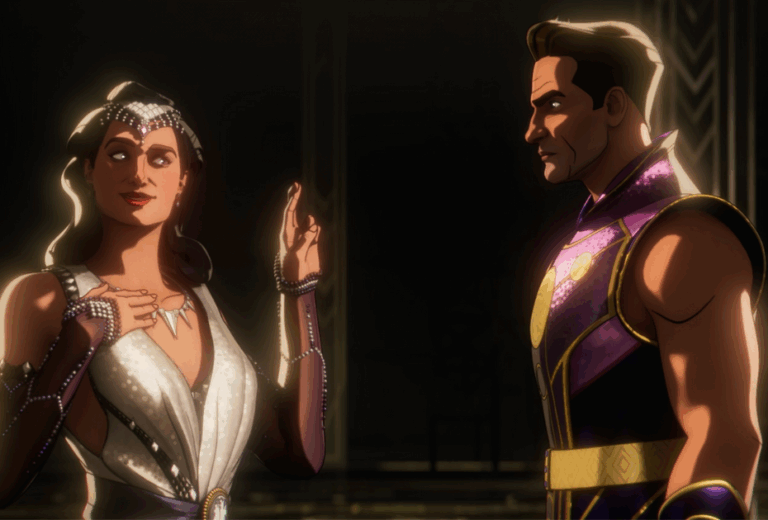The Girlfriend Review
The Girlfriend, a six-part series on Amazon Prime Video, explores the complex dynamics between a son, Daniel, his overbearing mother, Laura, and his new girlfriend, Cherry. The show presents a dual narrative structure, showcasing the same events from both Laura’s and Cherry’s perspectives, each casting the other as the antagonist.
Laura struggles with letting go of her son after the loss of her daughter years ago and views Cherry as a threat, while Cherry harbors a dark, violent past and seeks a lifestyle far removed from her working-class roots, using Daniel as her gateway. The story culminates in a dramatic and violent climax where Daniel kills his mother, and Cherry seemingly wins by securing her place in Daniel’s life.
The series probes themes of obsession, control, love versus ambition, and the painful transition of a son from his birth family to a new one. The show’s creative storytelling, strong performances—especially by Robin Wright as Laura—and its psychological depth make it a compelling watch despite some stretched elements in the plot.
The Girlfriend excels in its exploration of the psychological turmoil surrounding a son’s transition from his maternal family to his romantic partner. By splitting each episode into two halves from the differing perspectives of Laura and Cherry, the series creates a compelling narrative puzzle. This approach not only deepens character development but also forces the audience to engage in active interpretation, questioning the reliability of each perspective and the nature of truth itself.
Laura’s character is shaped by trauma—the loss of her daughter Rose casts a long shadow over her relationship with Daniel. Her obsessive protectiveness is not simply maternal instinct but a manifestation of a mother desperate to hold onto what remains of her family. The show captures the painful reality of parental grief and the difficulty of accepting a child’s autonomy, especially when the child’s new partner represents a threat to that bond. Laura’s actions, including lying about Daniel’s death, are extreme but rooted in fear and desperation, which makes her a tragic figure rather than a straightforward villain.
Conversely, Cherry is portrayed initially as a victim of Laura’s manipulations but gradually reveals a darker side. Her violent past and willingness to sabotage Laura’s life suggest a deep-seated ruthlessness. Cherry represents ambition unmoored from empathy, using love as a tool to elevate herself socially and economically. Her disdain for her working-class roots and longing for a high-class lifestyle add socio-economic dimensions to the story, making her not just a personal antagonist but a symbol of class struggle and social mobility.
The climax of the series, where Daniel kills Laura, is both shocking and symbolic. It signifies the ultimate severing of ties with his mother, but also the tragic cost of the toxic triangle that consumed all three characters. Daniel’s role is largely passive throughout, yet his final act is decisive and irreversible, suggesting the psychological toll of being caught between two obsessive women. The ambiguity about Cherry’s true feelings—whether she loves Daniel or merely desires his lifestyle—adds further complexity, leaving viewers questioning the nature of their relationship.
The performances elevate The Girlfriend beyond a typical psychological thriller. Robin Wright’s portrayal of Laura captures the nuance of a woman whose love is both protective and suffocating. Olivia Cook’s ability to shift between warmth and cold calculation makes Cherry a compelling and unpredictable character. Meanwhile, Lorie Davidson’s portrayal of Daniel as a somewhat passive, conflicted figure underscores the theme of a man caught in the middle of a destructive battle.
Overall, The Girlfriend offers a creative and psychologically rich exploration of family dynamics, obsession, and the complexities of love and ambition. Its innovative dual-perspective storytelling, strong acting, and thematic depth make it worth watching for those interested in intense character studies and moral ambiguities. However, its stretched plot and sometimes heavy-handed dramatics might not appeal to all viewers.
Conclusion
The Girlfriend is a gripping psychological drama that delves into the turbulent relationships between a mother, her son, and his girlfriend. Through its dual narratives, it challenges viewers to question perceptions and the nature of truth, while exploring themes of loss, obsession, ambition, and class.
Strong performances and a tight six-episode structure make it a compelling watch, even if the storyline occasionally stretches plausibility. Ultimately, it raises poignant questions about love, control, and the painful transitions inherent in family and romantic relationships.






